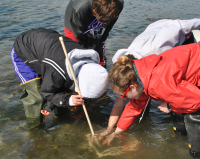 |
|
|
| SEARCH | YOUNG ENVIRONMENTAL LEADERS | |||||||||||||||||||||||||||
|
Existing MDIBL education programs include week-long teacher internships with scientists to restore and study ocean habitats and 5-day environmental leadership workshops for middle school students to participate in marine ecology research. In 2011, COSEE-OS began sponsoring the participation of up to 3 teachers or 14 students per year in MDIBL programs from School District Collaboration schools. Young Environmental Leaders Spring Break Program SDC: Waterville Senior High School and James F. Doughty School (Bangor) Educators: Jon Ramgren and Tracy Vassiliev April Break 2012 was a productive time for teachers and students from Waterville and Bangor Schools. Tracy Vassiliev, middle school science teacher from James F. Doughty School, brought six students, and Jon Ramgren and Wendy Serbent, educators from Waterville Senior High School brought 5 students to participate in this year's week-long "Young Environmental Leaders" program at MDI Biological Laboratory (MDIBL). This is the second year of the program, which is supported with funds from COSEE-OS. Three students who had participated in the program in 2011 returned as "mentors" for the program, including one from Bangor High School and two from Waterville High School. The students engaged in on-going documentation of a naturally occurring eelgrass site, used as a "control" in terms of understanding the recovery of restored eelgrass areas in Frenchman Bay. They de-lineated the site by taking coordinates with GPS units and created maps using open source QGIS software. They documented that eelgrass in this control area had decreased significantly since they had mapped the area in 2011. They also collected water quality data, which was comparable to data they had collected in 2011. In addition, the students and teachers helped set the stage for the up-coming eelgrass restoration season by devoting an afternoon to making biodegradable grids out of wood and twine. (During a restoration project, transplants are tied to the grids, which are transported to the sub–tidal area where the plants take root and grow.) At the culmination of the program, students presented their findings to parents and members of the MDIBL scientific community. The mentors presented their ideas for a conservation plan for Frenchman Bay, which were well-received by all. Twelve students and two teachers from Bangor and Waterville area schools spent April break at MDIBL, learning how to monitor water quality and restore eelgrass in nearby Frenchman Bay. In between field trips, they attended lectures, worked in the lab, learned about geographic information systems, and kept journals. On the last day the students presented what they had learned to parents, friends, and MDIBL staff. [more]
Quotes from Program Teachers
The students found the actual research activities were fun. Students said they want to do more science/environmental research in the
future.
Students became more comfortable with the lab and the lab techniques as the week went on. The also became better at using the GIS program.
|
|||||||||||||||||||||||||||
|
|||||||||||||||||





